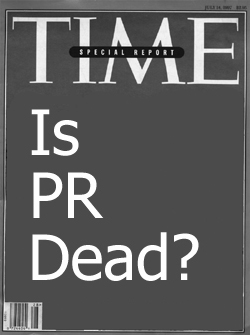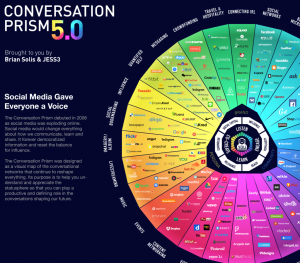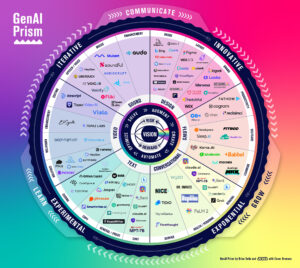Stop the presses…there’s another “PR is Dead” meme that’s circulating the blogosphere again. This time, all that’s new is that many bloggers are revealing that they prefer discovering new and interesting products on their own and breaking the news before anyone else.
Welcome to the news business.
Any print or broadcast news reporter would say the same thing, and honestly, it’s the competition and desire to break news first that’s driven the business for over 100 years.
Did that kill PR?
Nope.
Does that mean that PR didn’t play a role in the business of breaking news?
Hardly.
Perhaps the most troubling theme of this discussion however, is a very dangerous insinuation, disguised as expert advice, that suggests great products and services do not need PR. Certain bloggers are implying that “if you build it, they will come.” While others imply that if you’re great, people will notice what you do.
If you run a company and are considering DIY (do it yourself) PR, understand that it’s not impossible to do so without an agency or consultant, but resting on the expectation that market leaders and influencers will discover it and create a surging groundswell of visibility and demand for your product is as likely as winning the lottery.
Yes it happens. People win lotteries all the time.
But do you, as the leader of the company’s brand, responsibly gamble strategic opportunities to increase visibility and revenue for your business?
Of course not.
Hope and luck are not viable, effective or intelligent strategies for marketing any new product or service. Even the best products need help rising above parity and cutting through the noise.
It’s proactive versus reactive. And, in a fast-paced world where attention is a precious and ever-thinning commodity, sitting on the sidelines waiting for someone to discover you or solely relying on experimental grassroots campaigns may cannibalize your opportunity to generate industry-wide attention, your way.
Let’s not forget that some of the very bloggers who are suggesting that great products or people don’t need PR are also among the first to tell you that they will not cover your news once the first person has already written about it, citing that it’s “old news” – even if it’s only a few minutes old.
There are some incredibly adept PR professionals who can help companies do the right thing, the right way. There are also many more PR people simply working the grind and dispassionately pumping out garbage and tarnishing the PR industry in the process.
With that said, there are some new, clever, and innovative ways to break news nowadays and any smart executive would be unwise and practically irresponsible to issue news without first researching published strategies or consulting experts prior to releasing potentially momentous information – whether they ultimately do it on their own, do nothing, or contract a consultant or agency.
PR after all, is much more than press releases, canned pitches, and email blasts.
Now that doesn’t mean that Public Relations isn’t broken.
It absolutely is…
Traditional Public Relations is old and most of the principles, methodologies, practices, and tactics have gone unchanged for decades. But, what has changed is that these processes are no longer as effective as they once were.
The reality is that the Web (1.0 + 2.0) has forced the transformation of the PR business from the edge toward the center – albeit slowly. Make no mistake, it’s improving.
As I wrote earlier this year in “PR 2.0 = The Evolution of Public Relations, Nothing Less, Nothing More,” the reinvention of public relations was sparked ten years ago and its just now gaining momentum.
1) PR as an industry is in dire need of evolution in order to not only stay relevant, but also prove that in the social economy, it can be one of the most effective forms of marketing that cultivates customers, ambassadors, and enthusiasts.
2) Social Media is not New PR. It is a classification of “socialized” media and it is inspiring new PR, but they are not one in the same.
3) Darwinism will weed out those who don’t get it as well as those who pretend to get it (even if they don’t realize they don’t get it).
Those PR professionals that get it, will understand that much in the same way bloggers have created and earned notoriety and influence, that they too can harness the democratized, Social Web to cultivate an influential platform for which to help businesses generate strategic mindshare and presence. However, it requires an entirely new approach, mindset, commitment, and re-dedication to improving your craft, and with it, the rest of the industry will follow in your footsteps.
Welcome to what just may be the greatest evolution in the history of PR.
Connect with me on Twitter, Jaiku, LinkedIn, Tumblr, Pownce, Plaxo, FriendFeed, Plurk or Facebook.
UPDATE: Robert Scoble supports good PR and shares his tips for improving the landscape for PR 2.0. Thank you for the kind words!
Highly Recommended Reading for Startups:
Putting the Public Back in Public Relations
Free eBook: PR Tips for Startups
New Rules for Breaking News Part I and Part II
Addendum:
Some of the best in the business shared their insight on Robert Scoble’s post, “PR-less launch kicks off a stack overflow of praise.”
Jeremy Toeman, “My point was really about your comment that implies PR is useless. You’d never have heard of either Bug or Sling if it wasn’t for PR…I completely agree with you re building good products, and I completely agree with you re ‘me too’ products. But neither statement should be interpreted as not needing PR… If anything – it’s the really good ones that need the best marketing work done, to help position and distinguish them from the crowd…”
Francine Hardaway, “Wait, everybody! Define PR. PR is not a press release, or a crappy pitch. It’s the process of letting the right people know something is available — the public for the product. so Robert and Jeremy, you are both correct. Ideally, word of mouth is best, but it’s not fast enough for some publics (the tsunami is coming, run for the hills, quit eating Mexican peppers because they are causing salmonella). For those, press conference and press releases are best. –signed, Tired of Fighting to Explain This.”
Miiko Mentz, “I love controversy, but I must admit this topic is getting old. It’s as tired as the lame-ass pitches you are bombarded with on a daily basis.”
Noteworthy:
Marshall Kirkpatrick wrote an excellent and well-balanced post on ReadWriteWeb that explores whether good tech needs PR.
Michael Arrington of TechCrunch explores the challenges of PR in a new media world.






There are a lot of bad PR pros out there. Most of them just don’t know any better. Large firms don’t seem to be training their young guns well enough right now.
The bigger problem may be that there’s are a lot of bad journalists. Many can be brought and paid for (I know it sounds harsh, but I see it happen). Some are just looking to write controversy and will slam a company for no reason. Others write in only 8 word sound bites. So until Journalists improve, all companies need a PR firm to protect their interests.
That’s why we have PR, not to be media hounds, but strategic communicators.
We examined the DIY PR topic at our blog awhile back. http://www.inkincspot.com/2008/03/is-diy-pr-recipe-for-disaster.html
To that end, I believe it’s up to a PR agency to remain flexible and adaptable in order to truly be of any help to a start-up or small business looking for publicity. This means going beyond sending out press releases (duh) and running a campaign based on how many much of it is “billable hours.”
AND, the PR professional should be educating the client on the new “rules” of PR and what they should expect. Let’s face it, most entrepreneurs don’t know much about PR…only that they need it. Because the industry is in a constant state of flux, adaptations are necessary on both ends of the client-agency relationship.
Amen, brother. I personally feel that Arrington’s post went over the top, and that Rubel should stop whining about his inbox. If they truly want people in PR to do something else, stop telling them what they shouldn’t do, give some examples of what they could do instead. Its just so much easier to complain — and gets them more comments and hits to their blogs, too.
PR is facing an inconvenient truth. We are undeniably in the midst of climate change – the rise of a Web 2.0 world that all thought leaders value and embrace; while others stay stagnant with an ink-based, blanket approach.
Social media and the seemingly infinite channels we now have to communicate our messages and showcase our brands represents a new era for PR. The truth is that social media will have a positive impact on the role of PR – those who understand how to engage this environment will thrive. Those who dismiss it as hype will suffocate in their own dirty air.
free downloads ebook +free downloads wallpaper for>>> http://pccity.wordpress.com
‘If you build it they will come’ is a recipe for failure. Someone has to tell someone about things. It’s communication. Those in the PR business are being forced by social media to go back to their core competency: Excellence as communicators. Unfortunately many practices used currently including releases and pitching are too often replacements for clear, compelling communication.
Unlike the past where a bad release got circular filed, in social media it might get pilloried publicly. The risk profile of PR has changed significantly, IMHO.
PR is not dead but it is changing
It’s about process changes and education.. the best experiments today are the practice of tomorrow.
http://furrier.org/2008/08/13/yes-pr-is-changing-get-used-to-it-its-about-dialog-collaboration-transactions/
Brian, you are right PR is broken. I’ve been in PR for just under ten years, currently working for Porter Novelli, and in that relatively short time the focus has changed from developing relationships to justifying client spend. We’ve also shifted from quality to quantity.
In my first role I watched enviously as the account director took journalists out every week,often with the objective of just getting to know each other or re-affirming an existing relationship. Now neither hack nor flack seems to be able to spare the time out of the office. Which is understandable with the decrease in newsroom staffing levels over the past decade.
PRs have also been made lazier by media databases and email. When you were hand stuffing press releases into envelopes you paid more attention to who was going to receive them, now it costs nothing to add an extra 20/30 /100 names to email list just in case they might be interested.
@Martin Edic is alsoright, with the advent of social media, PR needs to go back to its core competency. Developing mutually beneficial relationships with the most relevant people.
The problem we face is persuading clients and colleagues that just because something is online doesn’t necessarily mean that it will happen faster or we have a magic shortcut.
The main problem is simply that PR people treat bloggers as they do mainstream reporters. Bloggers are not paid; mainstream reporters are.
Thus, the behavior of the blogger is impacted. The blogger tends to be more free-formed and less interested in someone’s point of view, and more their own.
Bloggers are columnists, not investigative reporters.
I have sound reasons for why I state that, but I can’t discuss them in detail at all. But I will say that I’ve achieved a level of success with a different approach.
Are PR educators revising the core curriculum to incorporate PR 2.0? Is anyone scoring college programs for how well they have changed and how well they teach the new philosophies, methods, and economics?
Well said Brian! I too am of the opinion that this is an evolution in the PR space. Social media will become the White Knight of transparency and PR will take on a new role as the medium through which businesses connect and communicate with their stakeholders.
Sure there are bad examples, as many comments have suggested, but I think we’re on the cusp of a real opportunity and hope we make the right move engaging it.
pr, marketing, advertising, it is all only lying, no matter how you spin it. professional lying. whoopee. and sooo proud of themeselves. whoopee.
no thanks.
QUESTION – What percentage of PR people do you think really know what they are doing?
The PR field seems a lot like a high school football team. Every guy on the team thinks he’s good enough to play in the NFL, but there’s only a handful of stars. The talented ones are absolutely wonderful – true Pro players, but right or wrong the stars will be judged by the overall performance of the group.
PR isn’t dead but it’s reputation may be tarnished. To restore respect and professionalism to the field, the challenge is getting the rest of the team up to speed.
Francisco Dao
http://www.thekillerpitch.com
Fast Company Buzz blogger
It would be so great to bring our senior teams around to your way of thinking Brian. There’s still far too much of ‘nice to have’ mentality for social media in my organization and I’m pushing hard for change…
Mithu
Seriously, this conversation is so beat.
Anyone with something to sell has something to say.
It was true in 1930, it was true in 1970, and it is true today.
Yes, many agency-based PR professionals don’t understand enough about digital communications.
But you know what, plenty of blog-savvy people don’t understand the type of fortitude and detail orientation it takes to execute a world class event.
They also seem to forget that the best PR people are invisible… they don’t need to raise their hands to the sky like a second-grader yearning to blurt out the right answer, “Me, me me!”
Everyone who discusses “PR 2.0” (give me a break…get a new catch phrase) seems to think their a rocket scientist for realizing the power of self-publishing.
Yes, many traditional PR people may not “get it.”
But the only thing worse than that is having to listen to the the ground-hog-day-like cacophony of “digital savvy” PR people and marketers regurgitate the same blather 24/7.
Talk less, do more.
@gregory you seriously believe that? Are little league coaches liars because they give awards to every kid on the team at the end of each season too?
@simple so, you’re contributing to the improvement of a tired, aging pr industry by complaining about those showing that there are better ways to practice PR today? Your tips: keep your hand down, let bloggers continue to beat a dead horse, and focus on doing your own work?
Once again, I and all of Porter Novelli Austin, fall more in love with you, Brian Solis! WELL SAID!
Brian, great, thoughtful post. I think many forget PR was, is and will be a relationship business, pure and simple. It’s very rare when one column or post creates an entire, sustainable and profitabley business. Within Intel PR, we talk about relationships, scoops, “cattle calls” and traditional and online issues all the time. There’s no one size fits all or simple model/strategy…it’s about relationships, respect and the acceptable tension between what’s right for a business vs. what’s best for a blogger or reporter.
This morning’s blog post from Chris Brogan (www.chrisbrogan.com) Proves that PR is not dead. It just has a new face. WE often see the posts from bloggers calling out PR pros who obviously don’t know what they are doing when pitching a blogger- but this post was actually complementing a pr pro for the correct approach of pitching- building a relationship first
Brian,
Couldn’t agree more. Let me address the issue at its core: PR is not synonymous with “publicist”. Check out my post at
http://www.techprnibbles.com/pr-is-not-synonymous-with-publicist/
Here elaborates the matter not only extensively but also detailly .I support the write's unique point.It is useful and benefit to your daily life.You can go thosetp http://www.cheap-nikeshox.com/nike-shox-R5.html sits to know more relate things.They are strongly recommended by friends.Personally
thank so much.